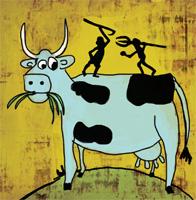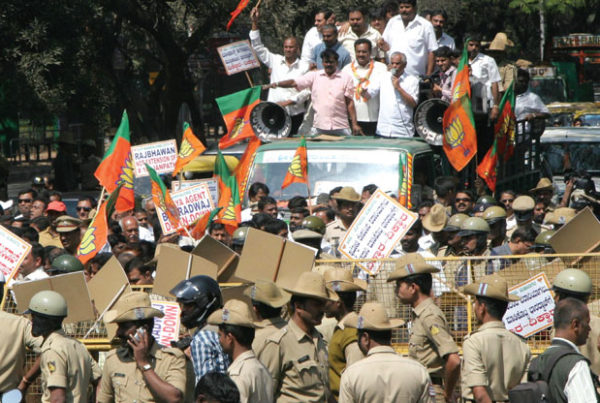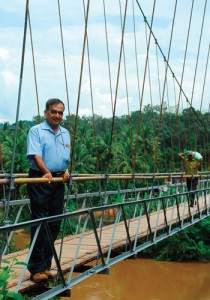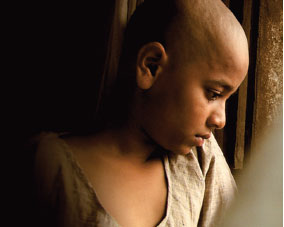Karnataka plans to criminalise possession of beef and restrict transport of cattle. But isn’t this an attack on secularism?
THE PRE-MONSOON session of the Karnataka state Legislative Council that began on June 28 will, by all counts, be a stormy one as the ruling Bharatiya Janata Party (BJP) government attempts to get a Bill through the Upper House. The Karnataka Prevention of Slaughter and Preservation of Cattle Bill 2010, if enacted, will impose a blanket ban on slaughter of cattle in the state.

Illustration: Samia Singh
Karnataka, like several other states in the country, has always had an Act that puts restrictions on the slaughter of cows. Balancing a Brahmanical notion of sacredness with widespread cultural practices of beef eating, the existing legislation allows cows to be sold to slaughterhouses if they are over 12 years of age — by when they stop producing milk. Before the sale, cows have to be mandatorily certified by qualified veterinary doctors. The proposed legislation is a significant departure from the existing Act on several counts.
By expanding the definition of cattle to include “a cow, calf, bull, bullock, buffalo”, the government proposes to ban beef completely. Further, the legislation proposes to criminalise the act of possession of beef and imposes severe restrictions on even the transport of cattle. Offenders can be imprisoned for a period of one to seven years, or fined Rs 25,000–50,000. Yet another significant departure in the legislation is the power that it accords to non-state actors — they are authorised to raid premises on mere suspicion.
For Dalits, Muslims, Christians and several other communities, consumption of beef is part of regular diet. What should draw our attention is that a democratically elected government that is bound by secular constitutional values is willing to criminalise cultural habits of millions of people to uphold the religious beliefs of a few. Neither is the matter one of headcount — if it were, Dalits, Muslims and Christians in the state are sure to outnumber those who are opposed to slaughter of cattle. It is about drawing the lines — us and them, the beef-eaters and those who don’t, the killers and the pious ones. And reinforcing those lines with the power of the State behind one section.
When the Bill was introduced in the state Assembly, there was a four-hour debate on the issue. Even as opposition party representatives rushed to the well of the House, Chief Minister BS Yeddyurappa talked at length of the proven medicinal benefits of cow urine and the possibility of Karnataka exporting it as a medicine. Yet another BJP minister talked of the state facing a deficit of milk if cattle were not accorded protection — the legislation had to go through, he said, for the sake of Karnataka’s children. In the end, the legislation was passed by voice vote in the lower House. It is impossible to tell who shouted the legislation down and who didn’t.
Outside the realm of cultural, religious and communal notions lies a purely economic one as well. A rally in Bengaluru to protest against the Bill saw 10,000 people warning the government of further unrest if the legislation went through. A large section of the crowd were farmers for whom the legislation would spell economic doom. Cattle that was unproductive and that could not be sold to slaughterhouses would be an economic burden they could not bear. To say nothing of the people who survive on the fringes of the slaughterhouses.
What is definite is that the line in the Preamble to the Constitution, where we promise ourselves a secular republic, will be read in a softer voice.
—
This article was originally published in Tehelka, a leading independent news magazine in India, known for its investigative journalism.


